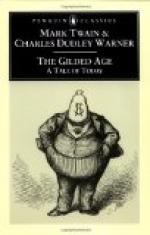“There is some truth in your observation, Colonel, but you must educate them.”
“You educate the niggro and you make him more speculating than he was before. If he won’t stick to any industry except for himself now, what will he do then?”
“But, Colonel, the negro when educated will be more able to make his speculations fruitful.”
“Never, sir, never. He would only have a wider scope to injure himself. A niggro has no grasp, sir. Now, a white man can conceive great operations, and carry them out; a niggro can’t.”
“Still,” replied the Senator, “granting that he might injure himself in a worldly point of view, his elevation through education would multiply his chances for the hereafter—which is the important thing after all, Colonel. And no matter what the result is, we must fulfill our duty by this being.”
“I’d elevate his soul,” promptly responded the Colonel; “that’s just it; you can’t make his soul too immortal, but I wouldn’t touch him, himself. Yes, sir! make his soul immortal, but don’t disturb the niggro as he is.”
Of course one of the entertainments offered the Senator was a public reception, held in the court house, at which he made a speech to his fellow citizens. Col. Sellers was master of ceremonies. He escorted the band from the city hotel to Gen. Boswell’s; he marshalled the procession of Masons, of Odd Fellows, and of Firemen, the Good Templars, the Sons of Temperance, the Cadets of Temperance, the Daughters of Rebecca, the Sunday School children, and citizens generally, which followed the Senator to the court house; he bustled about the room long after every one else was seated, and loudly cried “Order!” in the dead silence which preceded the introduction of the Senator by Gen. Boswell. The occasion was one to call out his finest powers of personal appearance, and one he long dwelt on with pleasure.
This not being an edition of the Congressional Globe it is impossible to give Senator Dilworthy’s speech in full. He began somewhat as follows:
“Fellow citizens: It gives me great pleasure to thus meet and mingle with you, to lay aside for a moment the heavy duties of an official and burdensome station, and confer in familiar converse with my friends in your great state. The good opinion of my fellow citizens of all sections is the sweetest solace in all my anxieties. I look forward with longing to the time when I can lay aside the cares of office—” ["dam sight,” shouted a tipsy fellow near the door. Cries of “put him out.”]
“My friends, do not remove him. Let the misguided man stay. I see that he is a victim of that evil which is swallowing up public virtue and sapping the foundation of society. As I was saying, when I can lay down the cares of office and retire to the sweets of private life in some such sweet, peaceful, intelligent, wide-awake and patriotic place as Hawkeye (applause). I have traveled much, I have seen all parts of our glorious union, but I have never seen a lovelier village than yours, or one that has more signs of commercial and industrial and religious prosperity —(more applause).”




